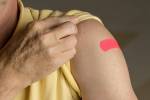H1N1 flu possibly killed boy
A 6-year-old North Las Vegas boy died Thursday from H1N1-related causes, the Clark County coroner's office said.
The death, which has yet to be confirmed by the Southern Nevada Health District, would be the first local death of a child from causes related to H1N1.
The boy, Daejon Meadows, died Thursday afternoon at Sunrise Hospital and Medical Center from respiratory failure, H1N1 and sickle cell anemia.
The health district on Monday would not confirm whether it was investigating the case.
Efforts to contact the boy's family were unsuccessful.
Of the 20 local swine flu deaths confirmed by the health district, all have been adults.
But the highest rates of flu involve those ages 10 to 14, with 400 cases per 100,000 Clark County residents, Brian Labus, a senior epidemiologist with the health district, told the Review-Journal late last month.
That is about eight times as many as those in the 40- to 44-year-old age group.
"The highest rate by far is people under 20," he said.
Children are among the priority groups that the health district is encouraging to get immunized for the swine flu because they are in close contact with each other in school and child care settings.
According to the Centers for Disease Control and Prevention, 26 percent of the recorded hospitalizations for swine flu nationally have been people ages 5 to 18, and 24 percent have been ages 25 to 49.
Nine percent have been 19 to 24.
Those 65 and older account for 7 percent of H1N1 hospitalizations.
The health district continues immunizing certain high-risk groups for the swine flu this week at its main office at 625 Shadow Lane, near Valley Hospital.
The office will be open from 10 a.m. to 6 p.m. today, Thursday and Friday. The office will be closed Wednesday for Veterans Day.
Those in the priority groups include pregnant women, caregivers of children younger than 6 months, medical personnel who deal directly with patients, and children and young adults between the ages of 6 months and 24 years, but excluding those with medical conditions between the ages of 19 and 24.
Two types of vaccine are available, one injectable and one inhalable. Individuals who are eligible to receive the inhalable FluMist will not be given the injectable vaccine.
Although considered at risk for contracting the flu, those between the ages of 18 and 64 with medical conditions are not being given the vaccine at this time.
Contact reporter Lynnette Curtis at lcurtis@reviewjournal.com or 702-383-0285. Review-Journal writer Brian Haynes contributed to this report.
HIN1 VACCINE ELIGIBILITY
(Priority Groups)
Should receive flu shot:
• Pregnant women
• People with underlying medical conditions or older than the age of 49 who live with or care for children younger than 6 months of age
• Health care and emergency medical services personnel 50 years of age and older, or with underlying medical conditions, who have direct patient contact
• All children 6 months up to 2 years of age
• Children between the ages of 2 and 18 years with underlying medical conditions
Can receive flu mist:
• Healthy people, including women who are not pregnant, who are between the ages of 2 and 49 and live with or care for children younger than 6 months of age
• Health care and emergency medical services personnel 49 years of age and younger with direct patient contact
• Healthy people and women who are not pregnant between the ages of 2 and 24 years























